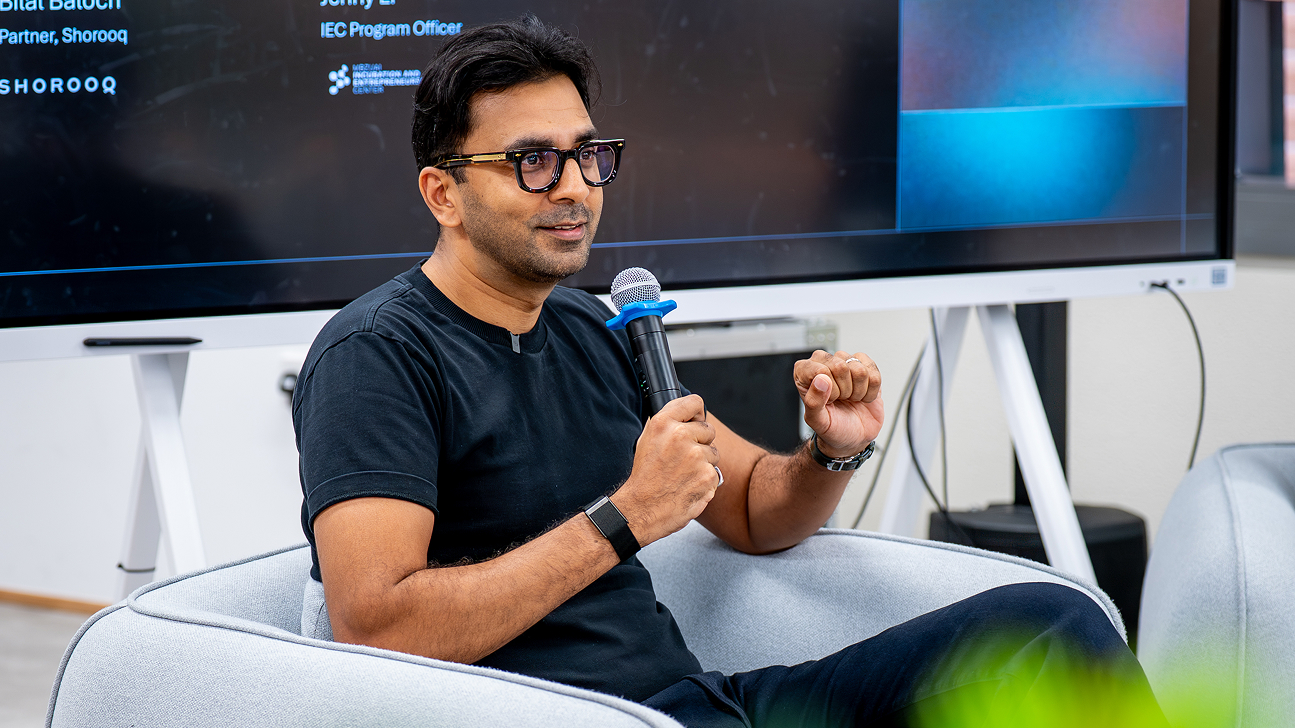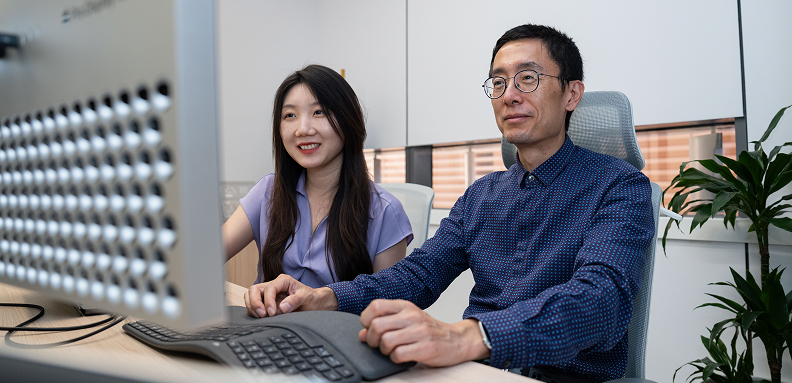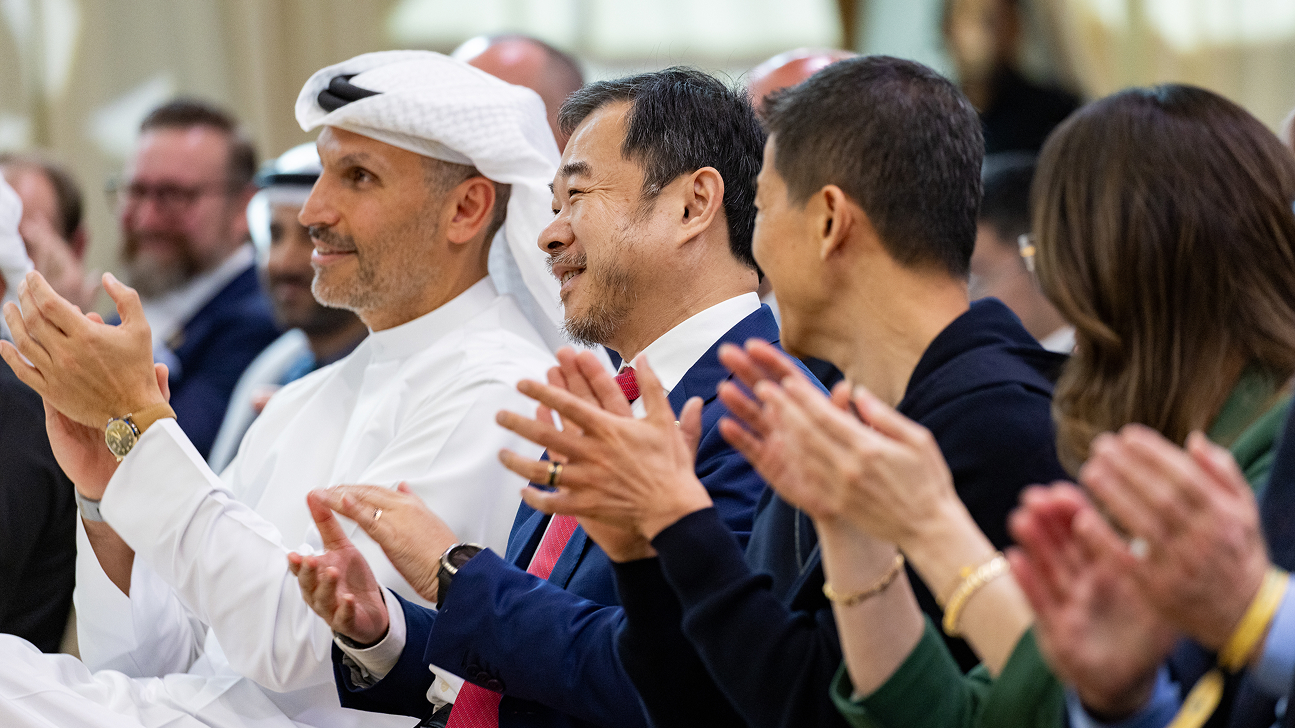AI’s next frontier: Shorooq’s Dr. Bilal Baloch on what it takes to secure venture capital in a shifting market
Thursday, October 23, 2025

As one of the fastest-growing investment firms born in the Middle East, Shorooq has built its reputation on identifying and backing early-stage founders shaping the region’s technology ecosystem. From fintech to gaming and now artificial intelligence, Shorooq has positioned itself at the crossroads of innovation and investment — connecting founders to funding, and making ideas go global.
At the heart of that mission is Dr. Bilal Baloch, Shorooq’s partner and co-lead of its AI-focused global $100 million fund with Presight. A political economist turned entrepreneur and investor, Baloch’s journey is as unconventional as it is instructive.
“I’m a completely accidental VC (venture capitalist),” he said during a fireside chat hosted by the Incubation and Entrepreneurship Center (IEC) at MBZUAI. “I started my career in US foreign policy research and as a chief of staff, and then transitioned into academia.” Looking for a faster pace, he pivoted into global macro advisory; a move that sparked his entrepreneurial journey.
He co-founded Enquire AI in 2017, an AI-powered business intelligence platform leveraging subject-matter expertise in real time that scaled quickly across the US and Asia. The experience, he said, gave him a front row seat to how research, policy, and technology intersect — as well as how capital fuels innovation.
Now he helps founders navigate that same intersection through Shorooq’s growing portfolio, which has expanded its assets under management from $2 million to $500 million since 2017.
Three things AI founders must master to secure VC funding
Take risks and partner up
For researchers and technical founders moving into entrepreneurship, Baloch urged them to take risks — but not alone. “Partner with people who can furnish or complement your skill set and find them early” he said.
The biggest challenge, he added, is translating world-class research into market-ready products. Technical founders should seek partners who understand policy, commercialization, go-to-market strategy, and execution.
“You need to have a balance of both,” he said, sharing that Shorooq sees multiple founders as desirable for this reason. Or you can learn it. “You are more than what you study … or where your job was. Don’t be a prisoner to your CV,” he adds. Anyone can become an entrepreneur, not just business school grads.
Understand the capital you’re raising
“One of the main pieces of advice I give to founders is you fundamentally need to understand how capital works,” Baloch said. “Who are you raising from? Where do they get money from? What’s their time horizon, and how much are they putting in?”
These are crucial questions — investors expect significant returns, sometimes 10 to 100 times their investment. Venture capital, he explained, is not free money; it’s risk capital that comes with a return horizon. Founders need to be as selective with investors as investors are with them.
Engage deeply with the ecosystem
For founders in the UAE and the wider region, access is both a gift and a challenge. While sovereign wealth funds follow structured engagement processes, the region offers a growing number of platforms for founders to connect, collaborate, and learn from these institutions. Baloch advises founders to show up, network, collaborate, and find mentors.
He emphasized that while the Middle East’s mentorship infrastructure is still maturing compared with the US, its accessibility far exceeds that of older ecosystems. “The region’s ecosystem offers founders unique access to leading industry players through public forums, accelerators, and partnerships hosted by the likes of Presight, Shorooq, G42, and Mubadala,” he said. “That is the benefit of not being in a deep market.”
By showing up, you might meet the person who changes your company’s trajectory.
The UAE’s AI strategy: A hub, a global partner to innovation
Baloch believes the UAE is uniquely positioned to lead in AI — but he’s clear about what it is not. “The UAE has evolved far beyond being seen merely as a capital source,” he said, adding that it is a global partner in building the next generation of innovation.
Global venture funds, he noted, now find it difficult to raise from the Gulf without adding tangible value. In the past, international investors often viewed the region primarily as a fundraising destination. Today, we’re seeing a more balanced dynamic — one built on genuine partnerships and long-term commitment. Now there are multiple reasons to partner and build here.
He points to the UAE’s balance of vision, neutrality, and long-termism as its competitive edge. The UAE has positioned itself well, and AI founders now have access to talent, sovereign data, GPU infrastructure, golden visas, and regulatory fast tracks that make experimentation easier than in Europe and even parts of the U.S.
“If you’re an autonomous automobile company founder in Europe today … you’re going to get stuck in reams of bureaucracy, regulations, and it’s incredibly difficult to get out and test. Whereas here (UAE) … sandbox licensing is far more straightforward, encouraging experimentation and innovation,” he explained.
That access, however, comes with responsibility. Baloch emphasized that the UAE’s AI strategy is inclusive and globally oriented — prioritizing innovation and impact over ownership and inviting global talent to build and test locally. “Ideate here, test here, but build for the world,” Baloch says is the main driver of their collaborative policies.
Global capital in a multipolar AI world
Baloch’s macro view blends his academic and investment backgrounds. He sees today’s AI landscape as “multipolar” — no longer dominated by Silicon Valley or Shenzhen alone. “There is little difference in terms of skill, talent, background, vision, and ideas between founders here and founders in Silicon Valley,” Baloch said.
“Emerging markets produce two-thirds of the world’s GDP, have half the world’s internet users, but less than 15% of venture funding goes into these markets,” he said. “One of the biggest advantages of where we are today (Abu Dhabi) is that capital and capability are here in abundance. The last few years have marked exceptional growth and momentum for us.”
From healthcare and finance to mobility and robotics, Baloch sees domain-specific AI as the next frontier. “We’re going to focus on platforms and application-related AI that goes deep,” he said. “Use cases around real change and productivity workflows in traditional, large-scale industries being built by domain experts [is] what will move the needle the most.”
The AI bubble exists, but will it burst?
When asked if he believes the world is in an AI bubble, Baloch didn’t hesitate. “Absolutely,” he said. “There are certainly elements of over-exuberance in parts of the market — but that’s typical of early, transformative cycles like AI.”
But he draws a critical distinction between destructive bubbles and productive ones. Baloch compared today’s AI surge not to the dot-com boom but to the computer revolution. “It’s a fundamental shift, and it’s here to stay,” he said. “This is truly global.”
“Jeff Bezos said the other day that there are different types of bubbles. There are bubbles that are disadvantageous to the economy and society … then there are others that ramp up innovation, taking society with them.”
He believes AI is the latter, and he is not alone. In the Amazon founder’s words (at Italian Tech Week): “This is real. The benefits to society from AI are going to be gigantic.” Experts warn of corrections in valuations and hype cycles, but the underlying transformation across labor markets, infrastructure, and productivity is irreversible.
Worldwide spending on AI is forecast to total nearly $1.5 trillion in 2025, according to Gartner, with venture capital investment providing added tailwinds. And while valuations may fluctuate, AI’s long-term potential continues to attract capital and talent worldwide.
The difference that Baloch sees in the UAE is due diligence and avoiding a gung-ho rampage. “I think discipline over valuations is important for founders, for VCs, and for the market, especially for ones that are growing and nascent like this one,” he said.
The final takeaway
In a region rapidly defining its own technological identity, voices such as Dr. Bilal Baloch’s offer both realism and optimism. There may be bubbles, corrections, and competition ahead, but in his view, the direction of travel is clear. Finally, if your company aligns with national priorities in AI, data, or industrial innovation, you’ll find available funds in the UAE.
- entrepreneurship ,
- startup ,
- incubation ,
- IEC ,
- guest talk ,
- venture capital ,
- funding ,
Related
Not just another deck: how MBZUAI’s okkslides is redefining executive communication
The MBZUAI startup is turning messy research and organizational context into decision-ready narratives with a human-in-the-loop AI.....
Read MoreMBZUAI marks five years of pioneering AI excellence with anniversary ceremony and weeklong celebrations
The celebrations were held under the theme “Pioneering Tomorrow: AI, Science and Humanity,” and featured events, lectures,.....
- campus ,
- celebration ,
- five year anniversary ,
- ceremony ,
- event ,
- board of trustees ,
- students ,
- faculty ,
When AI learns to listen: how researchers are decoding baby cries to help new parents
An AI-powered app trained on more than 1,000 baby cries aims to reduce stress for new parents.....
- incubation and entrepreneurship center ,
- AI for good ,
- human-centered AI ,
- IEC ,
- startup ,
- entrepreneurship ,


